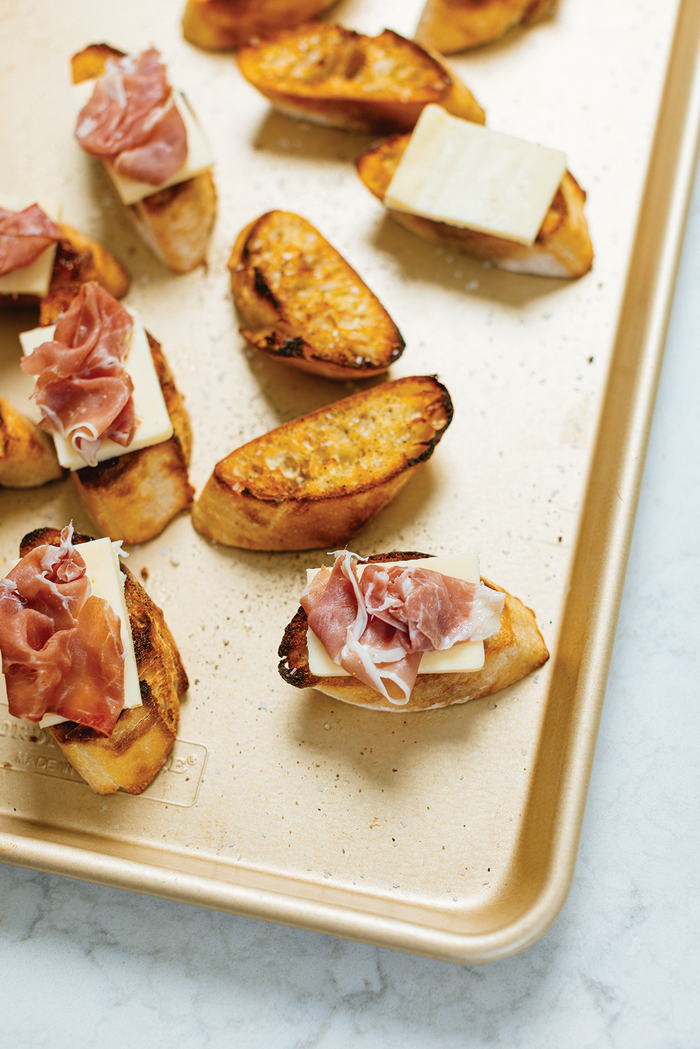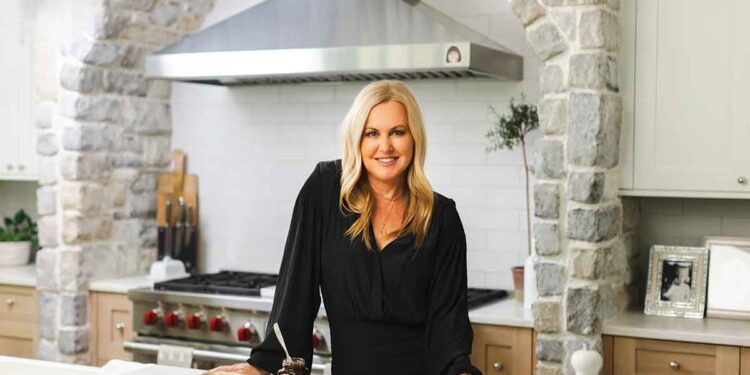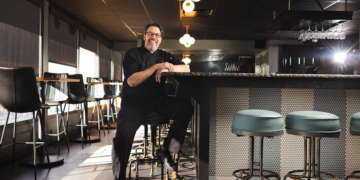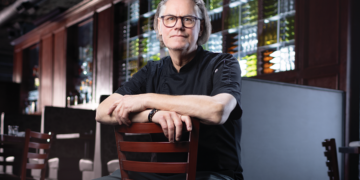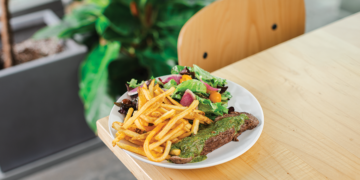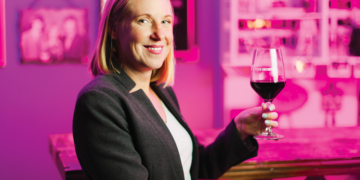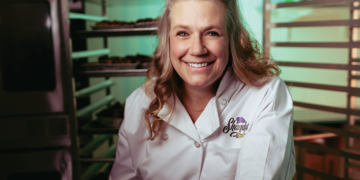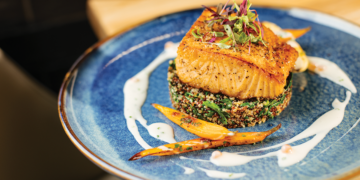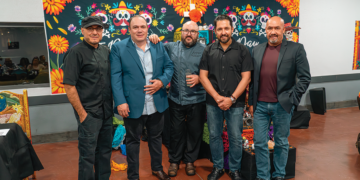Listen to this article here. Audio Provided by Radio Talking Book Service.
The notion that “anyone can cook” may seem reasonable to some, yet mystifying to those less temperature and knife block-inclined. With the right guidance, however, cooking can become an intuitive experience—and a healthy serving of fun.
Paula Dreessen’s Crème de la Crème
Paula Dreessen reads cookbooks like other people read novels—she devours them with great enthusiasm. In fact, her home has a cookbook library (something she requested when it was built), providing a ladle’s-length index for Crème de la Crème’s prospective students. She affectionately refers to her Silvercreek Estates home as the “Crème Cottage” or “Crème de la Crème HQ.”
For years, Dreessen has taught cooking classes out of her Elkhorn abode—though COVID had the chef making house calls. A year-and-a-half later, she moved into her current residence, replete with a custom-made teaching kitchen.
A prolific food blogger since 2015, Dreessen started cooking at a young age. She spent many years in the kitchen with her mother and other family members who taught her French cuisine, Thai cooking techniques, and more. She commenced her culinary career as a freshman in high school, initially picking up shifts at a local Italian restaurant.
Each cooking class she offers at ‘HQ’ features a theme, such as a “Cozy & Comforting” soup class or the “Elevated Classics” tutorial that aims to enhance classic dishes. The school’s menu is revised as the seasons change, and the recipes used in her class are all original concepts. She doesn’t teach other people’s recipes, she said.
Dreessen sources her ingredients locally, with seasonal herbs sprouting from her own garden. She is a proponent of utilizing quality ingredients to create quality meals.
She’s also willing to share her recipes.
“That’s how recipes evolve—by being passed on from one person to another,” she said.
Her favorite recipe to teach is her ‘Rustic Tomato Tart,’ and her favorite classes are those with generational participants, like mothers and daughters, because she enjoys the interactions that tend to unfold when they work together in the kitchen.
To anyone who is intimidated by the idea of cooking, Dreessen said, “So, you ‘don’t cook’? Guess what? You can!”
Dan Benigno’s Chef Around the Block
Chef Dan Benigno has been in the restaurant business for three decades and counting. He’s worked for both “big and little places,” but it was his time spent as a chef at the Union Pacific headquarters that compelled him to delve deeper into international cuisine.
“Cooking at UP, for the very diverse employees, I tried to cater to them,” he said. “I tried to get as authentic meals as I could for lunch. It was fun to try new things. I learned a lot from that stint.”
Nowadays, he offers a wide variety of cooking classes—including basic skills classes that cover things like kitchen safety and knife handling—as well as different cuisine classes including Asian, Italian, German, and Indian fare in two locations: his pop-up shop in Midtown or at the Hoff Family Arts & Culture Center in Council Bluffs.
He attended culinary school at the Arts Institute in Denver, but urged that those interested in culinary careers should focus on getting hands-on experience in restaurants to learn faster.
“If you want to learn Chinese food, you have to work in a Chinese joint. If you want to learn how to make pizza, you have to work in a pizza joint. If I want to get good at cutting onions, I need to sit down and cut 50 pounds of onions. Culinary school isn’t going to give students 50 pounds of onions to cut, but UP will,” Benigno said.
Benigno’s solution for cutting onions without tearing up? “Sharp knife – go fast,” he advised.
Many of Benigno’s students are shocked to discover that they have been doing something incorrectly in the kitchen, whether that’s chopping vegetables or boiling dumplings.
“I absolutely love classes. Watching them learn something new is always fun,” he said.
His two-hour classes start with mise en place.
“We cut all our vegetables, we cut all our produce, we cut all our proteins,” he said. “Everything is staged and ready to go before we cook anything. I start off at the basic, ‘This is a cutting board; this is how to safely use a cutting board; this is how to clean a cutting board; this is how to hold a knife; this is the proper way to hold your produce when you’re cutting, this is how we set up our station when we’re cutting.’
“The first hour is getting all the knife cuts done, getting all the vegetables for the dish—picking basil, cracked bell pepper, ginger, whatever the recipe calls for. The last hour is the assembly of all the ingredients and showing them how to present it, plating the dish, how to hold a ladle to pour. All those little details that you don’t really think about to make you more efficient in the kitchen because the bottom-line is, I think everybody belongs in the kitchen and my job is to make you more comfortable so you’re more likely to stay there. Getting you comfortable with a knife, getting you comfortable with making dishes, and not adhering so strictly to recipes.”
He often gets amused watching students in his classes who try to turn the class into a competition—siblings and couples are often the main culprits. “It’s just food,” he said, “Calm down , it’ll be OK!”
Shelley Elson-Roza’s Heirloom Fine Foods
Originally a hedge fund analyst, Shelley Elson-Roza and chef husband Tony returned to Omaha after living in Chicago and realized their mutual love for organic, farm-to-table food. Both culinary school graduates, they started teaching classes at various locations around the metro area before Shelley became a private chef.
“We both worked in high-end, fine dining kitchens, and a lot of people love to eat and experience gastronomy and love food,” she said. “But it’s almost like the movie, The Menu, where the guy knows a lot about food but is scared to cook it when he gets put on the spot.
“People want to learn to cook without recipes, how to make bread, people want to fall in love with the slower life, to make something with the food they get at the farmer’s market,” Elson-Roza said. “So, we teach cooking classes that bridge the gap between culinary school and the more demonstration-only classes.”
They offer two different tracks of cooking classes at their location on 72nd Street:
“We have a meat-focused track and then we have what we call ‘Culinary Adventures’ that are a like a trip to Morocco or a trip to Mexico that teach about the spices used in this cuisine and the staple dishes of that cuisine. So, we have the knife skills, bread making, soup and stock making, and then like the trip to Mexico, a trip France, a trip to Italy-type classes.”
Classes are three hours total between the cooking and the eating and are designed to make students feel as if they’re at a friend’s home, cooking a meal together.
“We’re just helping people slow down and fall in love with being in our kitchen,” she added.
The food used in their cooking classes is organic and sourced locally, when possible. She estimates around half of their recipes are original—the other 50% are authentic but mindful of not appropriating the recipe.
Tony also teaches cocktail classes and “the more masculine cooking stuff, like how to cook a perfect steak,” said Shelley with a laugh. Her favorite class to teach is the Peru class because that’s where she and her husband honeymooned.
Listen to this article here. Audio Provided by Radio Talking Book Service.
The notion that “anyone can cook” may seem reasonable to some, yet mystifying to those less temperature and knife block-inclined. With the right guidance, however, cooking can become an intuitive experience—and a healthy serving of fun.
Paula Dreessen’s Crème de la Crème
Paula Dreessen reads cookbooks like other people read novels—she devours them with great enthusiasm. In fact, her home has a cookbook library (something she requested when it was built), providing a ladle’s-length index for Crème de la Crème’s prospective students. She affectionately refers to her Silvercreek Estates home as the “Crème Cottage” or “Crème de la Crème HQ.”
For years, Dreessen has taught cooking classes out of her Elkhorn abode—though COVID had the chef making house calls. A year-and-a-half later, she moved into her current residence, replete with a custom-made teaching kitchen.
A prolific food blogger since 2015, Dreessen started cooking at a young age. She spent many years in the kitchen with her mother and other family members who taught her French cuisine, Thai cooking techniques, and more. She commenced her culinary career as a freshman in high school, initially picking up shifts at a local Italian restaurant.
Each cooking class she offers at ‘HQ’ features a theme, such as a “Cozy & Comforting” soup class or the “Elevated Classics” tutorial that aims to enhance classic dishes. The school’s menu is revised as the seasons change, and the recipes used in her class are all original concepts. She doesn’t teach other people’s recipes, she said.
Dreessen sources her ingredients locally, with seasonal herbs sprouting from her own garden. She is a proponent of utilizing quality ingredients to create quality meals.
She’s also willing to share her recipes.
“That’s how recipes evolve—by being passed on from one person to another,” she said.
Her favorite recipe to teach is her ‘Rustic Tomato Tart,’ and her favorite classes are those with generational participants, like mothers and daughters, because she enjoys the interactions that tend to unfold when they work together in the kitchen.
To anyone who is intimidated by the idea of cooking, Dreessen said, “So, you ‘don’t cook’? Guess what? You can!”
Dan Benigno’s Chef Around the Block
Chef Dan Benigno has been in the restaurant business for three decades and counting. He’s worked for both “big and little places,” but it was his time spent as a chef at the Union Pacific headquarters that compelled him to delve deeper into international cuisine.
“Cooking at UP, for the very diverse employees, I tried to cater to them,” he said. “I tried to get as authentic meals as I could for lunch. It was fun to try new things. I learned a lot from that stint.”
Nowadays, he offers a wide variety of cooking classes—including basic skills classes that cover things like kitchen safety and knife handling—as well as different cuisine classes including Asian, Italian, German, and Indian fare in two locations: his pop-up shop in Midtown or at the Hoff Family Arts & Culture Center in Council Bluffs.
He attended culinary school at the Arts Institute in Denver, but urged that those interested in culinary careers should focus on getting hands-on experience in restaurants to learn faster.
“If you want to learn Chinese food, you have to work in a Chinese joint. If you want to learn how to make pizza, you have to work in a pizza joint. If I want to get good at cutting onions, I need to sit down and cut 50 pounds of onions. Culinary school isn’t going to give students 50 pounds of onions to cut, but UP will,” Benigno said.
Benigno’s solution for cutting onions without tearing up? “Sharp knife – go fast,” he advised.
Many of Benigno’s students are shocked to discover that they have been doing something incorrectly in the kitchen, whether that’s chopping vegetables or boiling dumplings.
“I absolutely love classes. Watching them learn something new is always fun,” he said.
His two-hour classes start with mise en place.
“We cut all our vegetables, we cut all our produce, we cut all our proteins,” he said. “Everything is staged and ready to go before we cook anything. I start off at the basic, ‘This is a cutting board; this is how to safely use a cutting board; this is how to clean a cutting board; this is how to hold a knife; this is the proper way to hold your produce when you’re cutting, this is how we set up our station when we’re cutting.’
“The first hour is getting all the knife cuts done, getting all the vegetables for the dish—picking basil, cracked bell pepper, ginger, whatever the recipe calls for. The last hour is the assembly of all the ingredients and showing them how to present it, plating the dish, how to hold a ladle to pour. All those little details that you don’t really think about to make you more efficient in the kitchen because the bottom-line is, I think everybody belongs in the kitchen and my job is to make you more comfortable so you’re more likely to stay there. Getting you comfortable with a knife, getting you comfortable with making dishes, and not adhering so strictly to recipes.”
He often gets amused watching students in his classes who try to turn the class into a competition—siblings and couples are often the main culprits. “It’s just food,” he said, “Calm down , it’ll be OK!”
Shelley Elson-Roza’s Heirloom Fine Foods
Originally a hedge fund analyst, Shelley Elson-Roza and chef husband Tony returned to Omaha after living in Chicago and realized their mutual love for organic, farm-to-table food. Both culinary school graduates, they started teaching classes at various locations around the metro area before Shelley became a private chef.
“We both worked in high-end, fine dining kitchens, and a lot of people love to eat and experience gastronomy and love food,” she said. “But it’s almost like the movie, The Menu, where the guy knows a lot about food but is scared to cook it when he gets put on the spot.
“People want to learn to cook without recipes, how to make bread, people want to fall in love with the slower life, to make something with the food they get at the farmer’s market,” Elson-Roza said. “So, we teach cooking classes that bridge the gap between culinary school and the more demonstration-only classes.”
They offer two different tracks of cooking classes at their location on 72nd Street:
“We have a meat-focused track and then we have what we call ‘Culinary Adventures’ that are a like a trip to Morocco or a trip to Mexico that teach about the spices used in this cuisine and the staple dishes of that cuisine. So, we have the knife skills, bread making, soup and stock making, and then like the trip to Mexico, a trip France, a trip to Italy-type classes.”
Classes are three hours total between the cooking and the eating and are designed to make students feel as if they’re at a friend’s home, cooking a meal together.
“We’re just helping people slow down and fall in love with being in our kitchen,” she added.
The food used in their cooking classes is organic and sourced locally, when possible. She estimates around half of their recipes are original—the other 50% are authentic but mindful of not appropriating the recipe.
Tony also teaches cocktail classes and “the more masculine cooking stuff, like how to cook a perfect steak,” said Shelley with a laugh. Her favorite class to teach is the Peru class because that’s where she and her husband honeymooned.
